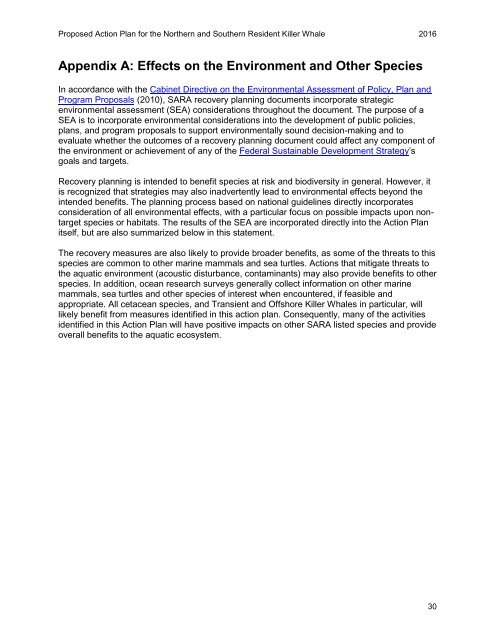Resident Killer Whale
Ap-KillerWhale-v00-2016Jun13-Eng
Ap-KillerWhale-v00-2016Jun13-Eng
You also want an ePaper? Increase the reach of your titles
YUMPU automatically turns print PDFs into web optimized ePapers that Google loves.
Proposed Action Plan for the Northern and Southern <strong>Resident</strong> <strong>Killer</strong> <strong>Whale</strong> 2016<br />
Appendix A: Effects on the Environment and Other Species<br />
In accordance with the Cabinet Directive on the Environmental Assessment of Policy, Plan and<br />
Program Proposals (2010), SARA recovery planning documents incorporate strategic<br />
environmental assessment (SEA) considerations throughout the document. The purpose of a<br />
SEA is to incorporate environmental considerations into the development of public policies,<br />
plans, and program proposals to support environmentally sound decision-making and to<br />
evaluate whether the outcomes of a recovery planning document could affect any component of<br />
the environment or achievement of any of the Federal Sustainable Development Strategy’s<br />
goals and targets.<br />
Recovery planning is intended to benefit species at risk and biodiversity in general. However, it<br />
is recognized that strategies may also inadvertently lead to environmental effects beyond the<br />
intended benefits. The planning process based on national guidelines directly incorporates<br />
consideration of all environmental effects, with a particular focus on possible impacts upon nontarget<br />
species or habitats. The results of the SEA are incorporated directly into the Action Plan<br />
itself, but are also summarized below in this statement.<br />
The recovery measures are also likely to provide broader benefits, as some of the threats to this<br />
species are common to other marine mammals and sea turtles. Actions that mitigate threats to<br />
the aquatic environment (acoustic disturbance, contaminants) may also provide benefits to other<br />
species. In addition, ocean research surveys generally collect information on other marine<br />
mammals, sea turtles and other species of interest when encountered, if feasible and<br />
appropriate. All cetacean species, and Transient and Offshore <strong>Killer</strong> <strong>Whale</strong>s in particular, will<br />
likely benefit from measures identified in this action plan. Consequently, many of the activities<br />
identified in this Action Plan will have positive impacts on other SARA listed species and provide<br />
overall benefits to the aquatic ecosystem.<br />
30


